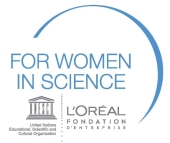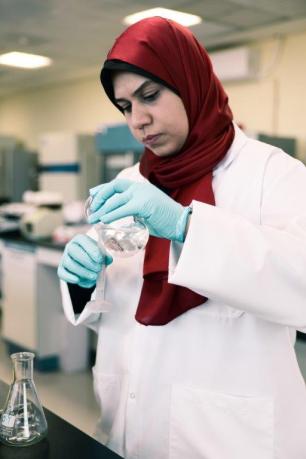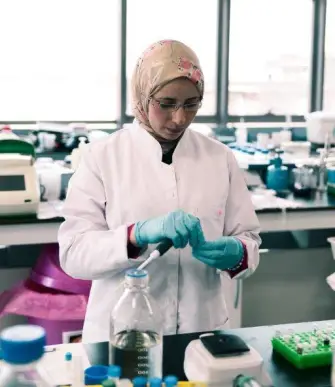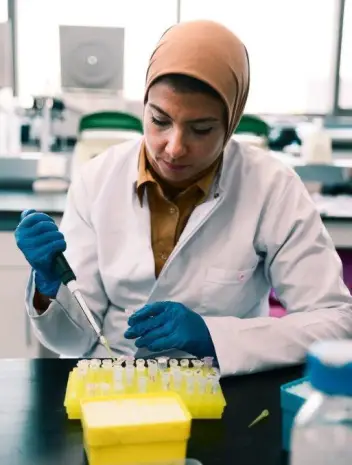Saturday November 17, 2018 By: WOE Staff

With their commitment to women empowerment around the world and to bring change to their lives, L’Oréal supports, sponsors and partners with women programs and organizations, to accomplish this mission. The L’Oréal-UNESCO For Women in Science recognizes accomplished women researchers, to encourage more young women to enter the profession.
 The initiative which began 19 years ago, aspires not only to bring to focus women scientist, but also to assist them to accomplish their scientific goals; for these scientists are the role models for future generations.
The initiative which began 19 years ago, aspires not only to bring to focus women scientist, but also to assist them to accomplish their scientific goals; for these scientists are the role models for future generations.
For their distinguished accomplishments, three Egyptian scientists received the 2018 L’Oréal-UNESCO For Women in Science Award
Marwa Balaha
 Marwa Balaha is an Egyptian researcher in the field of Pharmaceutical Chemistry and Drug Design. After her father passed away from cancer, she aspired to become an active participant in fighting the disease. This desire propelled her to join the Faculty of Pharmacy, at the University of Tanta.Due to her academic excellence, she was appointed a Teaching Assistant.Balahaobtained her master’s in Pharmaceutical Design and Pharmaceutical Chemistry. She works as an assistant professor in the Department of Pharmaceutical Chemistry at the Faculty of Pharmacy, Kafr El Sheikh University
Marwa Balaha is an Egyptian researcher in the field of Pharmaceutical Chemistry and Drug Design. After her father passed away from cancer, she aspired to become an active participant in fighting the disease. This desire propelled her to join the Faculty of Pharmacy, at the University of Tanta.Due to her academic excellence, she was appointed a Teaching Assistant.Balahaobtained her master’s in Pharmaceutical Design and Pharmaceutical Chemistry. She works as an assistant professor in the Department of Pharmaceutical Chemistry at the Faculty of Pharmacy, Kafr El Sheikh University
Through her master research, she has managed to design, synthesize and evaluate novel compounds as cytotoxic agents against non-small cell lung cancer. She performed molecular docking study to interpret the comparative differences in the binding interactions of the synthesized novel compounds at molecular level, as inhibitors of human dihydrofolate reductase enzyme, and to understand the structure activity relationships. She also performed quantitative structure–activity relationship (QSAR) study for prediction of biological activity of novel anticancer drugs against lung carcinoma.
She is currently working in a project for design and synthesis of anti-cancer drugs in collaboration with a medicinal chemistry labs in Italy. Balaha is a wife and a mother.
Dr. Noha Mostafa
 Dr. Noha Mostafa Ahmed is a Pharmaceutical Analytical Chemistry and Assistant Lecturer at the Faculty of Pharmacy – Assiut University
Dr. Noha Mostafa Ahmed is a Pharmaceutical Analytical Chemistry and Assistant Lecturer at the Faculty of Pharmacy – Assiut University
Based on the critical need for pharmaceutical analytical chemistry and its applications in quality control and pharmacological, biological and environmental analysis, Ahmed’s research interests focus on the development of innovative and proven analytical methods to identify and break down some drugs. Her goal is to develop new, simple, highly sensitive and economical analytical methods to separate and identify the drugs under study, as well as potential oxidative outcomes in various pharmaceutical preparations and biological and environmental samples.
Noha was born in 1988 in Tahta, Sohag in Upper Egypt. In 2005, she went to Assiut to complete her higher education. She obtained her B.Sc. in Pharmaceutical Sciences in 2010 from the Faculty of Pharmacy, Assiut University. She was appointed as a Teaching Assistant at the Pharmaceutical Analytical Chemistry Department in the same faculty. In January 2015, Ahmed obtained her master’s degree in Pharmaceutical Analytical Chemistry and became Assistant Lecturer. She is studying for her PhD, for which she received a fully funded scholarship from the Egyptian government in 2018.
Currently, she is an honorary research assistant at Faculty of Health and Life Sciences, De Montfort University in Leicester, UK. Her current proposal is focussing on the analysis of the trace amounts of pharmaceuticals and their bioactive metabolites in wastewater by using a special catalytic oxidation process of the target compounds. Besides her professional and scientific activities, Noha is a wife and a mother of a 2-year-old daughter.
Dr. Amira El-Yazbi
 Dr. Amira El-Yazbi is a researcher in Pharmaceutical Analytical Chemistry and Assistant Professor at the Faculty of Pharmacy, Alexandria University.
Dr. Amira El-Yazbi is a researcher in Pharmaceutical Analytical Chemistry and Assistant Professor at the Faculty of Pharmacy, Alexandria University.
El Yazbi’s research project focuses on detection of DNA damage, which leads to mutations that cause cancer and many other diseases. As theavailable methods to screen for DNA damage are too expensive for routine use, many products including over-the-counter drugs, cosmetics, and nutraceuticals, do not receive proper screening of their DNA damaging effect.
Amira’s research aims to develop a simple inexpensive high throughput method for the generic screening of DNA damaged by various pharmaceutical and nutraceutical products. The simplicity and low cost of the methods used would permit large-scale examination of the DNA damaging effect of many products and pollutants in the local environment.
In 2003, El Yazbi obtained her bachelor degree in Pharmaceutical Sciences with honors. She received her master’s degreein Analytical Chemistry in 2007 from the same faculty. In the same year, she was offered a scholarship from the Department of Chemistry, University of Alberta, Canada to conduct her PhD research, which she obtained in 2013. She was offered a teaching position in the Department of Chemistry at the University of Alberta, but El-Yazbi decided to return to Egyptto start her academic career atthe Faculty of Pharmacy, Alexandria University, where she works now as an assistant professor.In 2016, she returned to the University of Alberta as a visiting professor at the Department of Chemistry. She spent one year in Canada conducting research on sensitive detection of single nucleotide polymorphism and DNA damage. This continues to be her main research interest.
El-Yazbi aims to establish a robust validated assay that identifies potential carcinogens and screen for possible anti-cancer agents. She also aspires to train several young scientists and ensure knowledge and technology transfer.
***If you liked this article, don’t forget to subscribe to our newsletter and receive our articles by email.

[…] Tanta di Mesir, ”kata Marwa Balaha, salah satu pemenang penghargaan tahun ini, seperti dikutip Women of Egypt Mag, Rabu, […]
LikeLike
[…] sel kompaun yang baru untuk melawan sel-sel kanser yang berbahaya. Memetik kenyataan daripada womenofegyptmag.com, Balaha terinspirasi untuk menjadi seorang saintis yang boleh melawan kanser apabila ayahnya […]
LikeLike